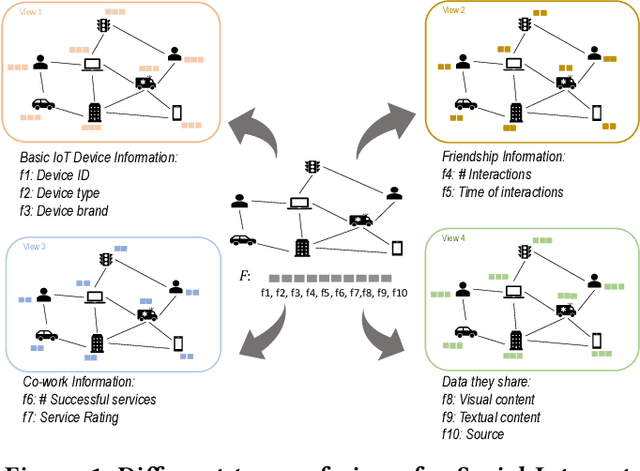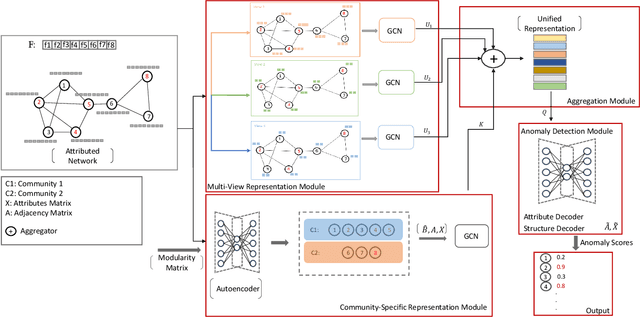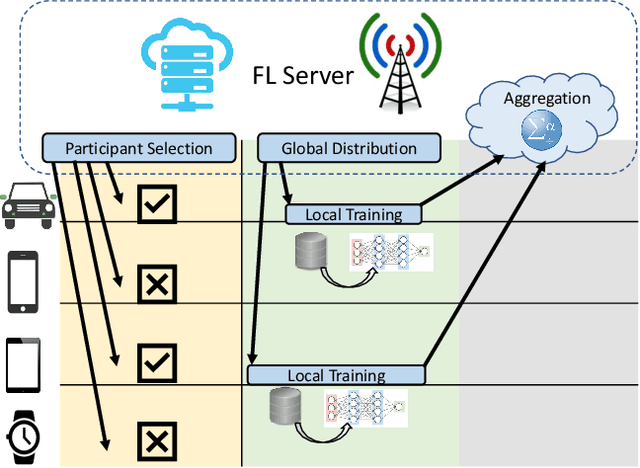Venus Haghighi
A Survey of Federated Evaluation in Federated Learning
May 19, 2023Abstract:In traditional machine learning, it is trivial to conduct model evaluation since all data samples are managed centrally by a server. However, model evaluation becomes a challenging problem in federated learning (FL), which is called federated evaluation in this work. This is because clients do not expose their original data to preserve data privacy. Federated evaluation plays a vital role in client selection, incentive mechanism design, malicious attack detection, etc. In this paper, we provide the first comprehensive survey of existing federated evaluation methods. Moreover, we explore various applications of federated evaluation for enhancing FL performance and finally present future research directions by envisioning some challenges.
GCN-based Multi-task Representation Learning for Anomaly Detection in Attributed Networks
Jul 08, 2022

Abstract:Anomaly detection in attributed networks has received a considerable attention in recent years due to its applications in a wide range of domains such as finance, network security, and medicine. Traditional approaches cannot be adopted on attributed networks' settings to solve the problem of anomaly detection. The main limitation of such approaches is that they inherently ignore the relational information between data features. With a rapid explosion in deep learning- and graph neural networks-based techniques, spotting rare objects on attributed networks has significantly stepped forward owing to the potentials of deep techniques in extracting complex relationships. In this paper, we propose a new architecture on anomaly detection. The main goal of designing such an architecture is to utilize multi-task learning which would enhance the detection performance. Multi-task learning-based anomaly detection is still in its infancy and only a few studies in the existing literature have catered to the same. We incorporate both community detection and multi-view representation learning techniques for extracting distinct and complementary information from attributed networks and subsequently fuse the captured information for achieving a better detection result. The mutual collaboration between two main components employed in this architecture, i.e., community-specific learning and multi-view representation learning, exhibits a promising solution to reach more effective results.
A Survey on Participant Selection for Federated Learning in Mobile Networks
Jul 08, 2022

Abstract:Federated Learning (FL) is an efficient distributed machine learning paradigm that employs private datasets in a privacy-preserving manner. The main challenges of FL is that end devices usually possess various computation and communication capabilities and their training data are not independent and identically distributed (non-IID). Due to limited communication bandwidth and unstable availability of such devices in a mobile network, only a fraction of end devices (also referred to as the participants or clients in a FL process) can be selected in each round. Hence, it is of paramount importance to utilize an efficient participant selection scheme to maximize the performance of FL including final model accuracy and training time. In this paper, we provide a review of participant selection techniques for FL. First, we introduce FL and highlight the main challenges during participant selection. Then, we review the existing studies and categorize them based on their solutions. Finally, we provide some future directions on participant selection for FL based on our analysis of the state-of-the-art in this topic area.
 Add to Chrome
Add to Chrome Add to Firefox
Add to Firefox Add to Edge
Add to Edge